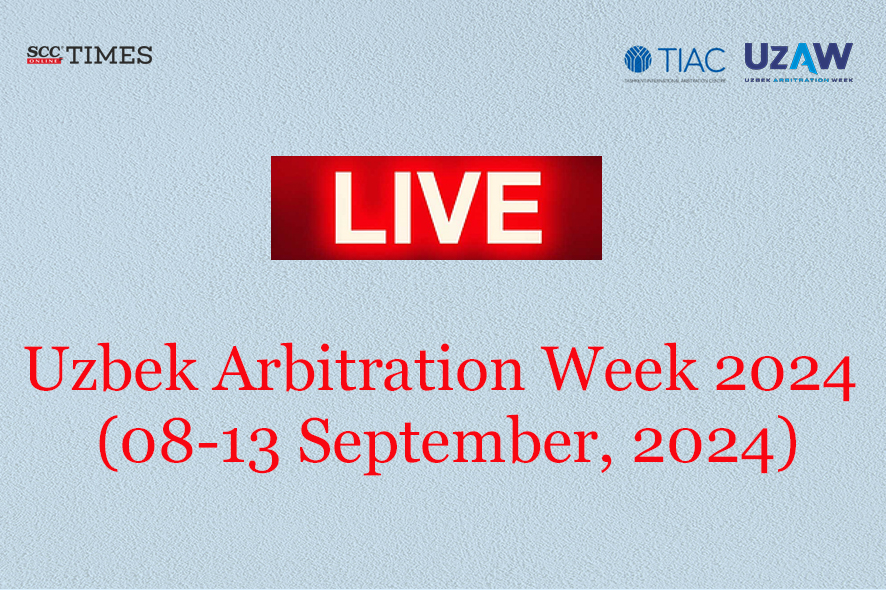The 4th edition of the Uzbek Arbitration Week is organised by the Tashkent International Arbitration Centre (TIAC) and the Chamber of Commerce and Industry of the Republic of Uzbekistan with the active support from many other development partners and organisations. The theme for the event is “Putting Uzbekistan on global arbitration map”.
TIAC delivers state-of-the-art dispute resolution services to federations, associations and athletes through arbitration or mediation.
Day 1
08 September, 2024
TIAC Run at Tashkent Botanical Garden
Day 2
09 September, 2024
Putting Uzbekistan on the map of international arbitration as a preferred seat for the arbitral proceedings in the CIS region and beyond – latest developments
Ms. Diana Bayzakove welcomes guests and dignitaries to Uzbek Arbitration Centre. She says that-
“The diversity and support overcoming challenges and showcasing its unity and collaboration on the world stage we are confident that we will continue forging connections building bridges and setting new standards in the field of international arbitration.”
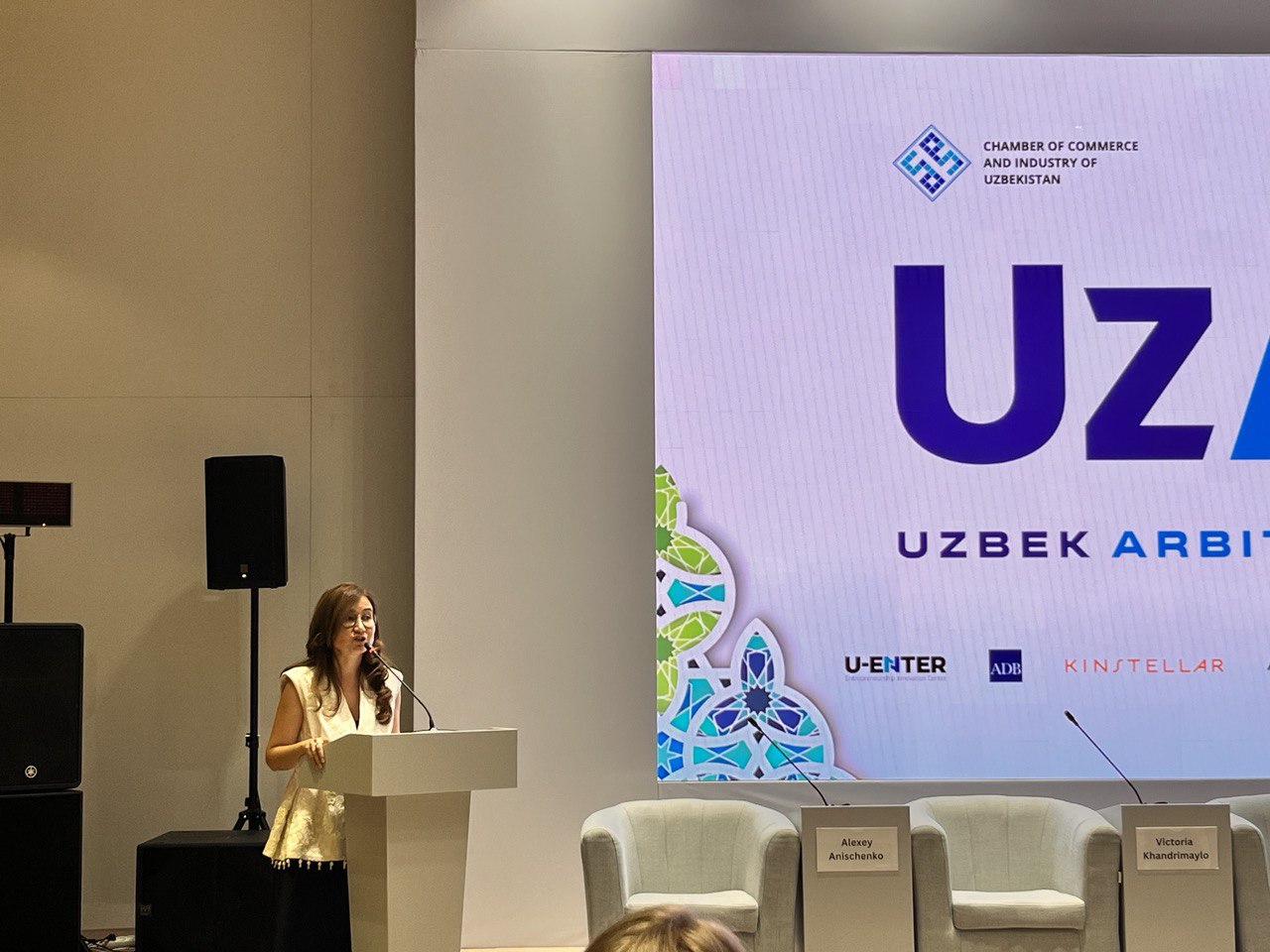
Mr. Islambek Rustambekov, Acting Director of State National University welcomes dignataires and talks about the vision of putting Uzbekistan on the map of international arbitration as a preferred seat of arbitral proceedings. TIAC is uniquely positioned in international arbitration coupled with our ongoing and commitment to the rule of law. It provides a solid foundation for this ambitious endeavor international arbitration center in collaboration with the Chamber of Commerce and the Ministry of Justice. TIAC has been instrumental in driving this vision forward through initiatives and such a big start to the Uzbek Arbitration Week.
Mr. Joe Liu, Member TIAC Court of Arbitration delivers keynote address.
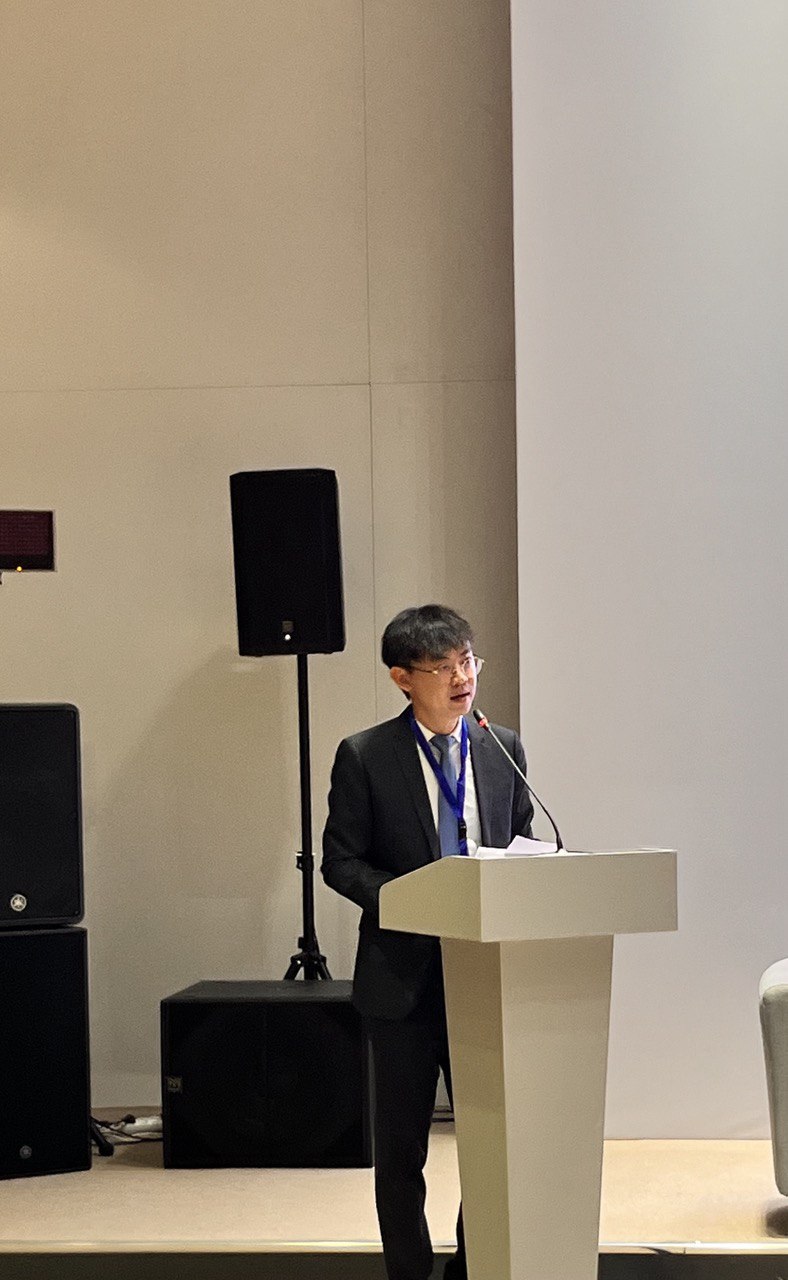
“Arbitration procedure is gradually becoming too rigid and formulaic. It was said that when determining the procedural framework at the outset of proceedings, arbitrators should take parties’ expectations more into considerations and tailor the procedure to the particularities of each case, rather than simply following general procedural templates.”
– 2012 International Arbitration Survey: Current and Preferred Practices in the Arbitral Process
Mr. Liu talks about the three key aspects
1. Understand what is a dispositive issue;
2. how to identify a dispositive issue;
3. Set Appropriate procedures.
Takeaways:
1. Dispositive determination can bring time and cost savings to overall proceedings, if managed properly.
2 .Issue identification should be attempted early, and requires parties’ input and tribunal’s sound judgment.
3. Only Truly dispositive issues should be identified for early determination.
4. Proper procedures should be set to determine dispositive issues expeditiously while ensuring due process.
Session 1: Pioneering Innovation in international arbitration: TIAC- HKIAC Cross Institutional Rules and regional collaborations
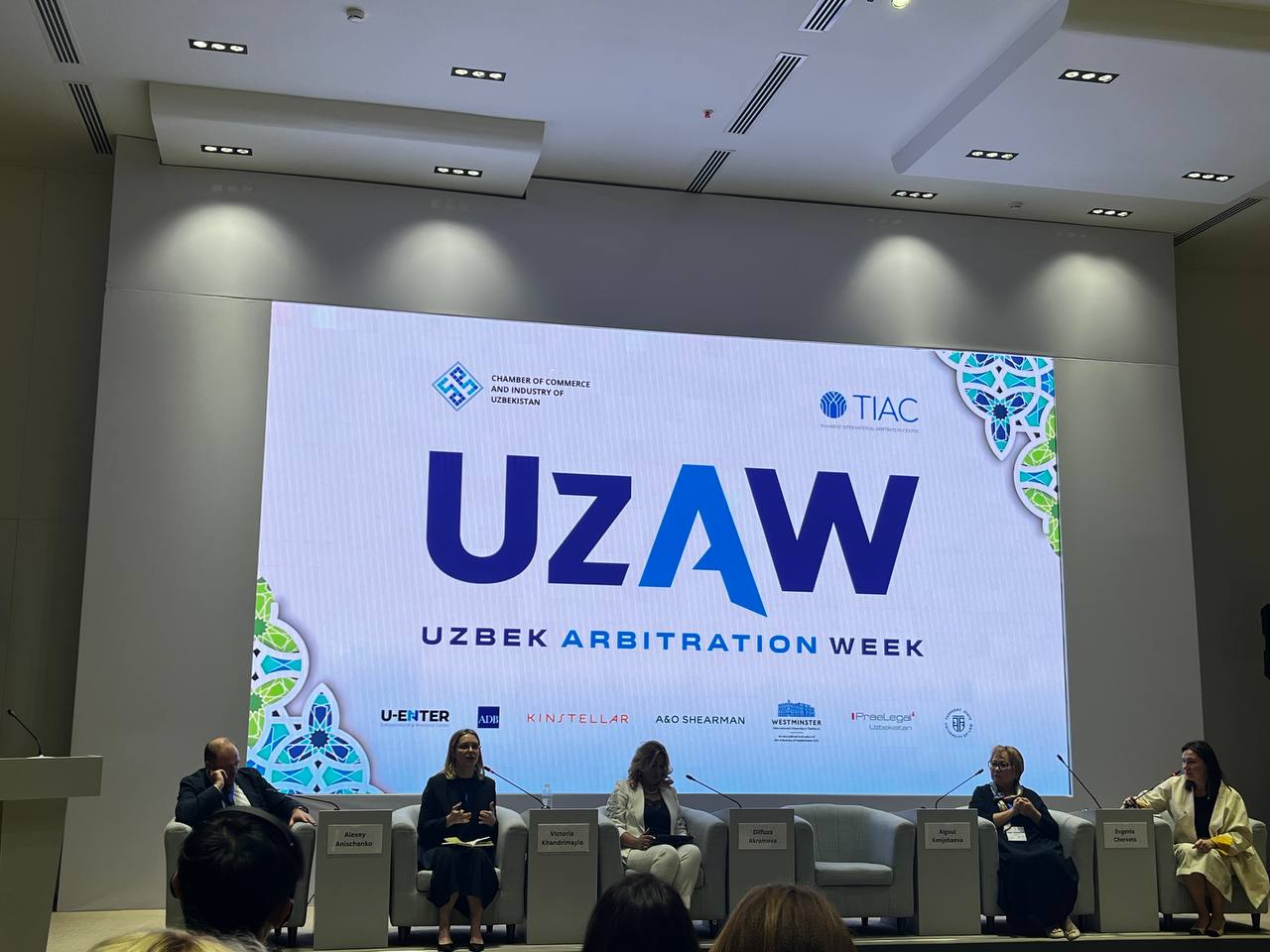
Speakers: Alexey Anischenko (Partner, Anischenko Legal), Victoria
Khandrimaylo (Counsel at HKIAC), Aigoul Kenjebaeva (Partner, Dentons Kazakhstan)
Moderator: Evgenia Chervets (Partner at Chervets & Partners, Mr. Alexey Anischenko, Partner, Anischenko Legal
Ms. Victoria Khandrimaylo talks about her experience on working on arbitration and the mechanism of transferring agreement. She also talks about collaboration between Uzbekistan and Hongkong for various reasons.
Ms. Khandrimaylo, talks about Regulation of Major Institutional Arbitration TIAC- HKIAC
TIAC:
1. Registration of the Notice of Arbitration
2. Correspondence with Parties and Arbitrators
3. Storage and Management of deposits
4. Extension of Deadlines
For Uzbekistan and Hongkong, the development: cooperation agreement between both the countries with respect to Arbitration and litigation. The Cross institutional rules has been made and the goal is to encourage international arbitration in the region. TIAC (permanent administration body) and HKC.
She talks about IRO-ARBITRATION LAW
Hong Kong Arbitration Act (Cap 609)
• UNCITRAL Model Law (2006)
• Extensive list of interim measures
• Comprehensive protection of confidentiality
• Review of arbitral awards on issues
• Amendments to reflect developments in arbitration
• Emergency arbitrator
• Intellectual property disputes
• Third party funding of arbitration
• High threshold for setting aside arbitral awards in Hong Kong.
In order to make the rules applicable, a clause can be added in the agreement. The seat of arbitration can be different either Uzbekistan or Hongkong. Main Functions of TIAC and HKIC collaboration.
- TIAC will be incharge of administrative issues;
- Communication with parties will be managed by TIAC.
- Procedural issues will be taken care by HKIC such as appointment of arbitration etc.
HKIAC:
1. A prima facie decision on whether an arbitration agreement may exist under the Rules.
2. Appointment of an arbitrator (emergency apumpa) (see 10.2/ (see 1.3, see 1.5 Appendix 1)
3. Challenge of an arbitrator (Article 11.6)
4. Adding additional parties
5. Making any changes to the form, attention of the arbitral tribunal to the merits of the matter without its own intervention
Ms. Dilfuza Akramova, says TIAC was founded in 2019. It is supported by Chamber of Commerce and Industry of Uzbekistan. The main goal of TIAC is development of arbitration in Uzbekistan and attraction of foreign investment in high technologies. The key partners of TIAC are Netherlands, Italy, Russia, China, Turkey, Uzbekistan, etc. Despite the fact that TIAC is young arbitration, it has more than 70 applications. As in-house attorneys, we can draw our attention to the regulation. This is a unique enter to institutional arbitration. This Regulation has been developed by using all the best practices of both the institutions i.e. HKIC and TIAC.
Ms. Akramova talks about Cooperation between HKIAC and TIAC:
1. Start of cooperation: 2019
2. Areas of joint work:
• Arbitration
• Mediation
• Alternative forms of dispute resolution
3. Joint project- Inter-institutional Arbitration Rules
4. What are the specifics of the Regulation:
- Parties to select the seat of arbitration.
- Adaptation of specific needs
- Joint management of rules.
- Speed of the Resolution.
- High Quality of Arbitration.
- Transparency of the dispute Resolution.
- Non-disclosure and maintaining confidentiality
She also mentions that no other Regulation provides Regulation accelerated review of arbitrations. It provides speedy disposal within 6 months.
Mr. Alexey Anischenko, talks about his experience with HKIC and TIAC. He also focusses about client satisfaction. He vouches on old traditional practices as the most reliable ones. He talks about personal communication and institutional collaboration with old traditional institutions.
He focuses on three aspects:
1. Education: Implementation of summer schools, case studies, and similar events aimed at corporate lawyers and legal consultants.
2. Youth: Focus on involving the young generation of arbitrators in our region through various events, competitions.
3. Roadshow: Activation of regional cooperation and personal (not only online) presence in target markets for direct contacts with local arbitration.
In his conclusion, he quotes Constantinos C. Markinos “the process of developing superior strategies is part planning, part trail and error, untill you hit upon something that works.” He also mentions how insightful such discussions are at Uzbek Arbitration Week.
Ms. Aigoul Kenjebaeva, Partner Dentons Kazakhstan talks about the trends in development of International Commercial Arbitration (ICA):
- Nationalisation of ICA;
- Formalisation of the Rules;
- Judicialisation;
- Cross Fertilisation;
- Creation of ICC;
- Collaboration and Mediation;
- Growing influence of arbitration practitioners.
Uzbekistan is set to review the terms of International Commercial Arbitration. She also appreciated the TIAC growth and efforts to make Uzbekistan as the popular centre for Arbitration.
Session 2: Building a favourable seat for the arbitral proceedings prospects and opportunities
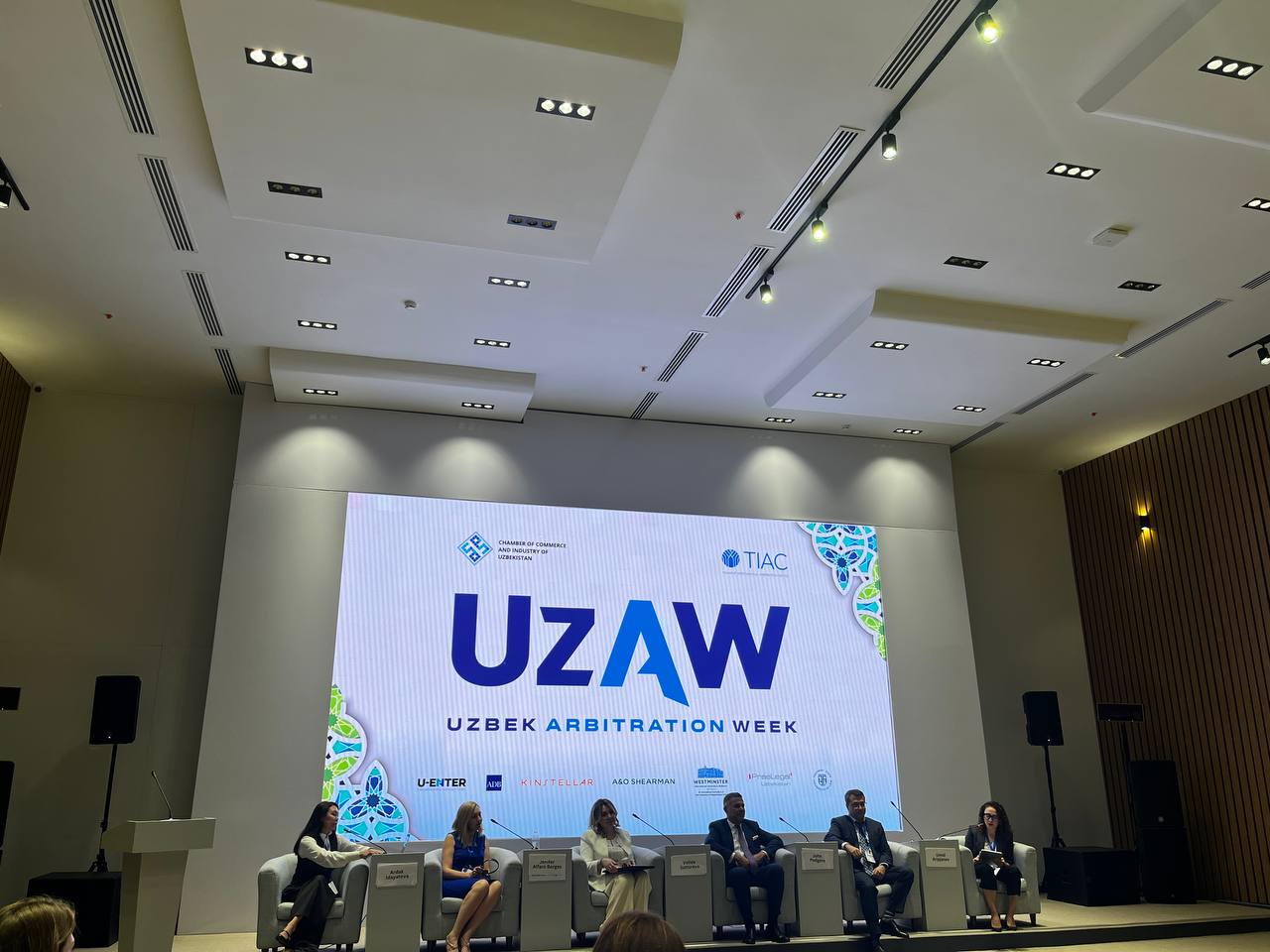
Speakers: Valida Sattarova (Judge of the Supreme Court of Uzbekistan), Jenifer Alfaro (President of the Association of Notaries of Uruguay/Member of CIArb Faculty/Professor of Commercial Law and International Arbitration), Ardak Idayatova (Partner at Kinstellar Kazakhstan), Umid Aripjanov (Partner at Centil Uzbekistan)
Moderator: Nata Ghibradze (Counsel at Hogan Lovells Germany)
Ms. Valida Sattarova, Judge, Supreme Court of Uzebkistan, welcomes all delegates on behalf of Supreme Court and TIAC. Today, the international situation is that the international companies who prefers international commercial arbitration as an option.
Using mechanisms of ADR for time and cost saving. The reforms of presidential acts have impacts on judicial review of the proceedings of the global development area. One of the effective of the peaceful dispute resolution is international arbitration. The parties can make sure of impartiality of the arbitrators, and they have the ability of choosing arbitration on their own. It does not necessarily to be linked with citizenship. It also ensures confidentiality.
International Commercial Arbitration was adopted in Uzbekistan. Ms. Sattarova also shared the statistics of execution of awards in Uzbekistan. One of the rejections of execution application where parties have not been informed or procedures have not been followed.
In Uzbekistan, every single case of execution is reviewed properly and any resolution which was made in terms of international standards, the awards can be executed as per the international standards. She later thanked the organisers for being at Uzbek Arbitration Week as also many important issues are being discussed.
Mr. Umid Aripjanov, shares his experiences with one the disputes where they were unable to go to Stockholm, hence, they resorted to digitalisation of the process. The online disputes hamper the process such as cross examination. Under the comfort of that government’s assistance the regional Centre for Arbitration in Cairo into a place before being an effective place for resolving disputes even if you are not forcing to resolve your disputes. It is very comforting that the statistics in terms of Uzbekistan’s enforcement of these particular types of decisions. There is a glass of developments and lots of trade will rush right now in Uzbekistan.
In certain jurisdictions in central Asia where we try to promote local centres, they established rule saying that certain disputes are subject to exclusive jurisdiction of local Courts. The dispute team from international border has been moved and had to also follow this to localise disputes.
Ms. Ardak Idayatova talks about the experience of Uzbekistan implementing process where disputes can be resolved on the basis of English Law. In order to establish a seat, certain amendments were introduced to the Kazakhstan. The Code has been prepared for building AIFC Court which is independent of Kazakhstan justice system. Dispute resolution is increasingly becoming popular. She also highlighted that businesses now trust AIFC Court than Kazakstan law justice system. The initiative is successful and it is most important that AIFC provides high quality, independent and impartial justice system.
In practice, the stage of applying to Kazakhstan court is avoided considering the court practice is inconsistent. It provides speedy enforcement of the award.
Mr. John Podgore talks about significant development in arbitration world. He also points about DIFC-LCIA which is now defunct and no longer operating. The same can impact the arbitration world. Transfer to DIAC not automatic. The decision of DIAC is not being accepted by courts in other jurisdictions. Influence of UAE arbitrations will take success of arbitration world to another level.
Ms. Jenifer Alfaro Borges, talks about the importance of the seat of arbitration. She explained the same through following concepts:
- Lex Arbitiri : Different to the law of the merit; could be other than seat procedural law;
- Competence of Tribunal: To assist interim measures;To control challenge of Arbitrators and Arbitral Awards.
- Limit: Never enter to the merit of the case. Review of the Argument of abitrial tribunal; Review of evidence.
- It’s not an Appeal.
The judges exercising a supportive or Supervisory role in Awards.
She also talks about Spain Constitutional Tribunal, 2021
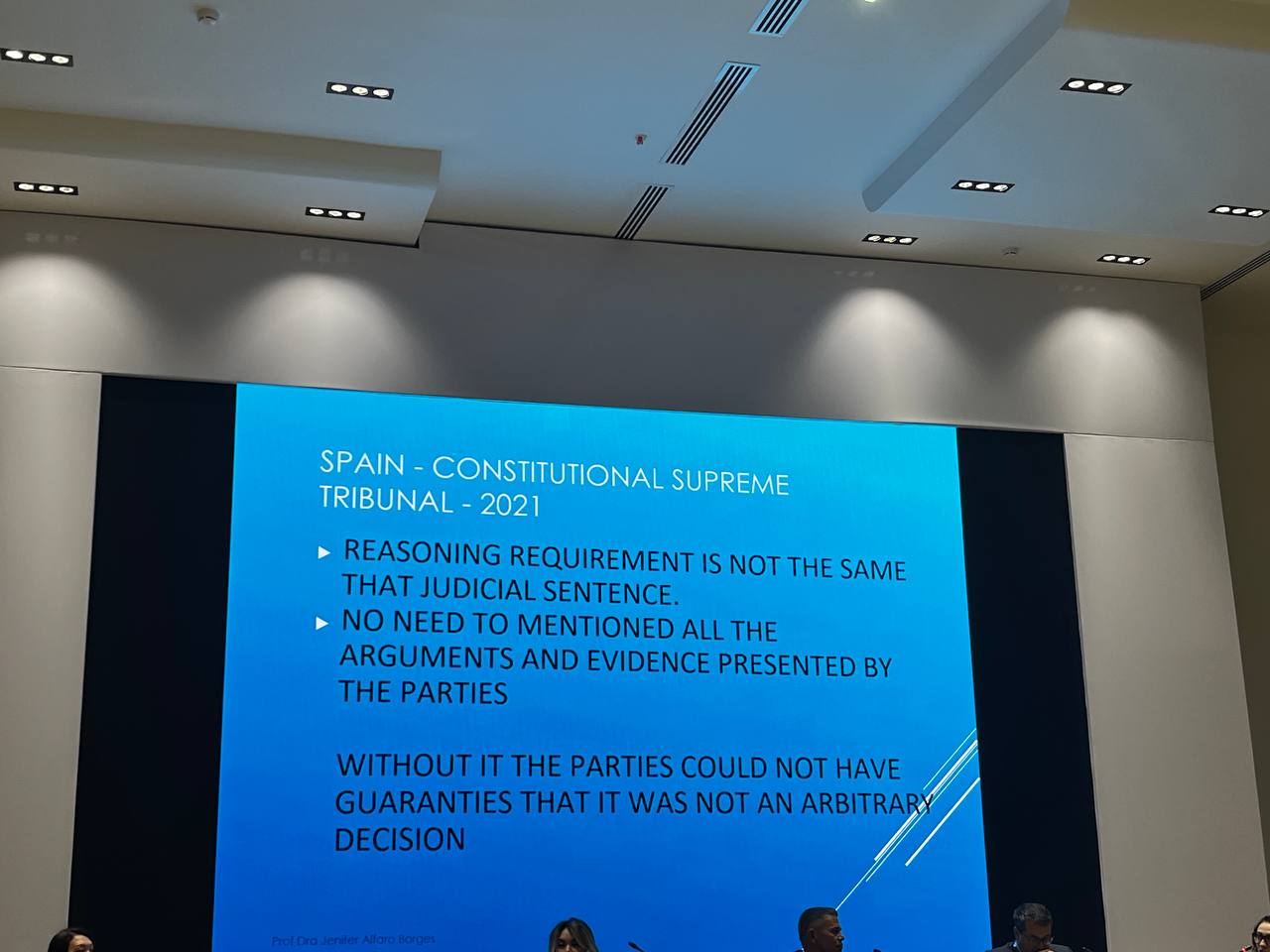
The duty to disclose is important to ensure transparency and confidence.
Session 3: Dispute Avoidance and management: establishing infrastructure for the prevention and effective resolution of commercial and investment disputes.
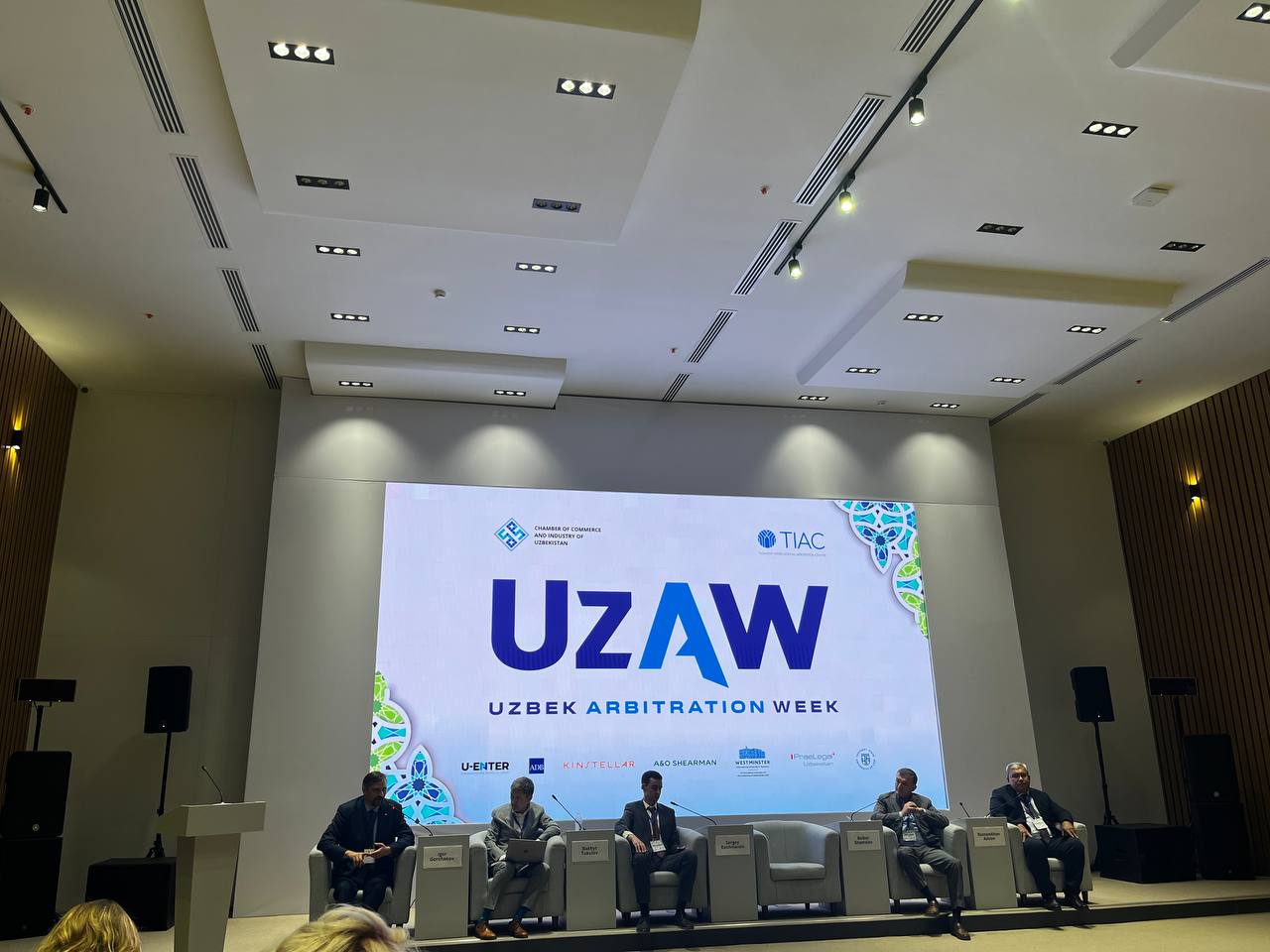
Speakers: Rustamkhon Azizov (Head of Foreign Investment Council’s Secretariat), Bobur Shamsiev (Partner, Dentons Uzbekistan), Sergey Bachmanov (Partner at Ernst &Young Uzbekistan), Bakhyt Tukulov (Tukulov and Kassilgov Litigation Kazakhstan)
Moderator: Igor Gorchakov (Partner, Head of Finance and Disputes, CIS, A&O Shearman UAE)
Mr. Bobur Shamsiev, Partner, Dentons on the question of scope of mediation says that Mediation can become the tool that can help parties eliminate exercise like commercial arbitration. Mediation is an appropriate tool for cost of time and to maintaining the project for which resources have been spent.
On the question related to expectations of investors, Mr. Sergey Bachmanov talks about surveys being done on the countries for making investment. As per their 2022 Report on three countries, the investment has declined. The interest in Uzbekistan with the respect to investment is colossal. There is a survey that there is global competition with respect to investment. The foreign investors are also interested in digital component of the State.
On the question on How Mediation can be helpful in Uzbekistan, Mr. Bobur Shamsiev, says that Mediation has huge potential to resolve disputes effectively. The courts do not take mediation agreement seriously and the mediation awards are not taken seriously. In Uzbkeistan, the 2022 statistics are not favourable for investors and the investors are unable to repose faith on the State.
On the question of measures to promote mediation as a effective tool for dispute resolution, Mr. Rustamkhon Azizov, says that the Government has huge task to acquire huge investment till 2030. We have a regulatory framework, and we ensure that we use the same effectively that within the cooling off period, we can request the investors that the resolve within the cooling off period.
Mr. Bakhyt Tukulov while talking about Mediation says that Litigation is costly, and Mediation is just a tool and how to use this tool depends on a number of factors. In Kazakhstan, the system is developed for Mediation, but the parties take a chance approach to go to court.
Mr. Tukulov in his presentation regarding global conflict the beginning phase talks about:
- Investment structuring, correct VIT, foreign investor status (example of a client who went for transparency);
- Regulatory dispute, taxes, license (strategy);
- Early response mechanisms (“fork in the road”, evidence base);
- Provocations (internal problems, processes);
- Early risk assessment (where the wind is blowing from);
- Who makes decisions in the conflict on both sides
The key components of active phase of Global conflict :
- Strategic goal of defense (collection of evidence, delay, case formation) – real and ideal goal;
- Decision making center (who makes decisions, the trend is towards increasing the number of decision making centers: local director and global director);
- Team (resources) (checks, criminal cases);
- Incoming correspondence, outgoing correspondence (tracking, deadlines, complaints);
- Collection and processing of documents (accounting, correspondence);
- Safe storage of documents communication;
We must focus on dispute avoidance and not dispute management says Rustamkhon Azizov.
Session 4: Comparative Analysis of Arbitration practices in Asia: challenges and opportunities for international business disputes
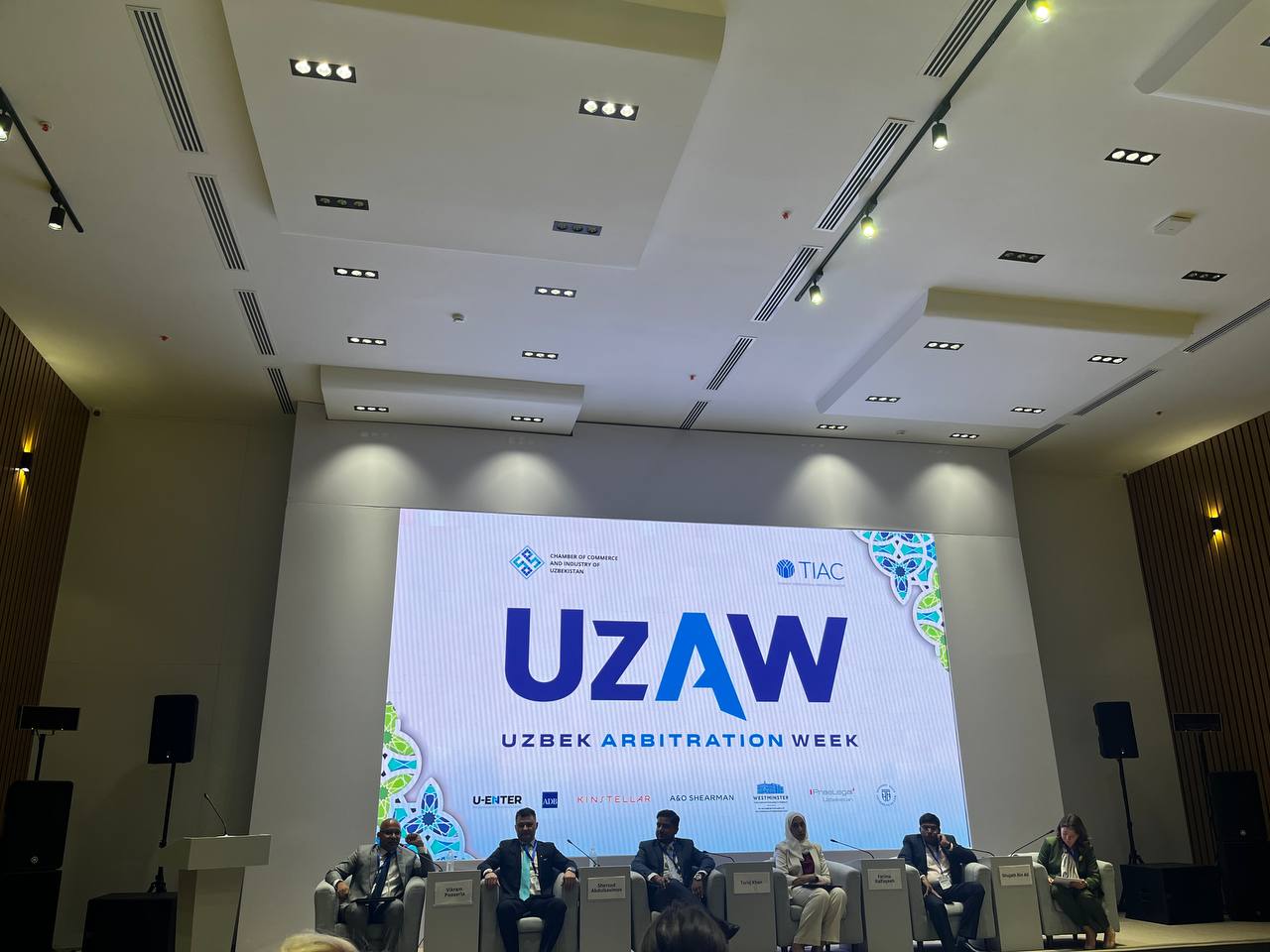
Speakers: Tariq Khan (Registrar of International Arbitration and Mediation Centre Hyderabad), Fatima Balfaqeeh (Vice Chair of the ICC UAE’s Commission on Arbitration & ADR Steering Committee), Vikram Pooserla (Senior Advocate at CV Law Chambers India), Shujath Bin Ali (General Counsel at Re Sustainability India) Sherzod Abdulkasimov (Partner at Praelegal Uzbekistan)
Moderator: Maria Lyubimova (Partner at Chervets & Partners)
What is the role of arbitral institutions in attracting investment, Mr Tariq khan says, any institution which has the ability to attract the investment must work on bringing investment.
TIAC has created a platform through Uzbek Arbitration Week brought many arbitration institutions to share their best practices and create Uzbekistan a preferred seat of arbitration.
In 1991, Singapore had the maturity that if they need investment, they created a model of arbitration, mediation etc. which benefitted investors. Arbitral institutions gives a confidence to the investors that the institution is impartial, cost effective and focus on speedy resolution system. The ecosystem is the need of the hour, and one needs to push the arbitral institution to bring investment.
Mr. Vikram Pooserla, there are lot of clients from India moved abroad, and fundamentally, the major issue was applicability of law. Hence, in such cases, arbitration comes into picture.
Ms. Fatima Balfaqeeh talks about UAE and the maximum number of enforcement of awards which takes place in UAE. DIFC and ADGM are considered part of eco-system and any enforcement coming from overseas can be executed. Egypt is considered as one of the oldest authorities for enforcement arbitration.
Mr. Shujath Bin Ali talks about general counsels’ role in promoting arbitration and mediation. The fundamental aspect is to complete the projects and hence, the purpose is to align the main goal. The strong role is to educate and create awareness in the business. It is absolutely important to explain the perspective and benefits of going to mediation and arbitration as the mode of dispute resolution. We work together to build an eco-system which will help in transparency and speedy resolution.
Mr. Tariq Khan talks about mediation as a dispute resolution. Until the society attains the maturity to understand mediation as effective dispute resolution. There is a scope of making mediation mandatory.
We are never told to resolve conflict but we are always told to adjudicate disputes, says Tariq Khan
Dispute is merely the visible part of conflict. Mediator can neither advise nor suggest. Mediator only facilitate the dispute resolution process.
To make any hub of arbitration, it is important to have strong legal system, enforcement laws and a good set of rules for governing councils. Lastly, the infrastructure.
He addresses the question – what is the role that arbitral institutions are playing in attracting investment? It is not a matter of discussion anymore that any jurisdiction which wants to establish itself and attract investment, must have a robust dispute resolution mechanism and once that is ready, that is when people find it comfortable in doing business. While discussing role of governments, he says that governments are now pushing arbitration in various countries in Asia. He says that arbitral institutions are important because there are two choices either you can have an arbitral institution, or you can make arbitration become a part of thing.
Talking about Asia being a hub of arbitral institutions, he says that these arbitral institutions take on themselves to create an ecosystem in the state, in the jurisdiction. TIAC is a platform for all of us to meet each other, share the best practices and all about how we can improve and what is it that we can offer to the business at large. Emphasising on the role of arbitral institutions, he says that institutions in Asia are trying to push it as hub, and good thing is that Asia is becoming a relevant market and investment in flowing from all sides.
He stresses that there should be some kind of arbitral institutions which will take responsibility on them to resolve the disputes of investors, running into millions of dollars. He also explains that once these institutions with set of rules are in, they give confidence to the investors.
Ms. Fatima Balfaqeeh shares that UAE has enforced mandatory commercial mediation. It has 80% success rates and last year, a law has been passed on mediation to give some sort of enforceability to mediation.
Mr. Sherzod Abdulkasimov shares about the challenges and opportunities in mediation. Uzbekistan has made progress in arbitration and mediation ecosystem. Uzbekistan is well presented and well positioned in dealing with disputes of other regions as well.
Day 3
10 September, 2024
English Law Day
Co-Organised with UK Bar Council, British Embassy

Mr. Nick Emmerson, President, The Law Society says that this program is a testament of the popularity of the English law as choice in commercial transactions. The flexibility and carefully drafted principles are able to provide to them.
Session 1: Updates on recent English law developments: Sanctions; enforcing awards; third party funding
Speakers: Mr. Richard Beniston (Regional Sanctions Attache, British Embassy, Astana), Mr. Luke Wochensky (Kinstellar Central Asia), Mr. Igor Gorchakov (Partner, Head of Finance and Disputes, CIS, A&O Shearman UAE), Ms. Yulia Barnes (Barnes Law UK)
Moderator: Mr. Daniel Barton, (Partner, Alvarez & Marsel, UK)

Mr. Luke Wochensky says that since 2021, the world is changing dramatically, and sanctions are in place with UK working very closely with US on this. He also talks about Russian economy, its collapse and sanctions.
Mr. Igor Gorchakov talks about imposition of sanctions around the world and how US Government is using it.
Session 2: Development of International Dispute Resolution Mechanisms in the Central Asia
Speakers: Islambek Rustambekov (Acting Rector, Tashkent State University of Law), Jamsheed Peeroo (Barrister, 36 Group UK), Elijah Putilin (Putilin Dispute Management, Uzbekistan), Saniya Perzadayeva (Unicase Kazakhstan)

Mr. Jamsheed Peeroo clarifies why English law is followed in centers being set up in a civil law jurisdiction. He said it’s because English law is widely used in commercial transactions across the world and this is so even where the transactions have nothing to do whatsoever with England or the United Kingdom. He added that parties continue to use English law is because English law is profoundly inspired by a very simple principle-commercial common sense. He clarified that these not his words, these are the actual words of the Judges.
He says Centres are codifying English law in Statute. He remarked that “this is quite original and quite ingenious because the Commonwealth user by looking at that statute will feel at home and will recognise the principles that that user applies everyday”.
Ms. Saniya Perzadayeva on AIFC Court and IAC – The Leading Dispute Resolution Hub in Central Asia:
Court
•More than 130 Judgments & Orders;
•More than 640 lawyers registered for rights of audience from 35 jurisdictions;
•Companies from more than 27 countries involved in commercial disputes.
IAC
The panel of more than 50 prominent arbitrators and mediators;
More than 3150 arbitration and mediation cases registered;
IAC and AIFC Court are included in more than 10,000 commercial contracts as a dispute resolution clauses all over the
While discussing AIFC Court Jurisdiction and Operation, she says that the functioning of the AIFC Court revolves around the following key aspects:
• Procedural rules based on principles and procedures of English common law;
• Applied standards correspond to best practices of the world’s leading financial centres
The AIFC Court has exclusive jurisdiction over:
• Any disputes arising between the AIFC’s Participants, Bodies, and/or their foreign employees;
• Any disputes relating to operations carried out in the AIFC and regulated by the law of the AIFC;
• Any disputes transferred to the Court by agreement of the parties; and
• The interpretation of AIFC Acts.
On why one should choose AIFC Court, she highlights that it has the following gains:
• Unique expedited process at the Small Claims Court of cases, the value of which do not exceed USD 150,000;
• All the justice comes from the common law background and has a global reputation for their independence, impartiality, integrally and unconditional application of the rule of law;
• Publicly available Judgments and Orders;
• Any lawyer who confirms his eligibility for professional practice may be admitted to represent a party in the AIFC court;
• Possibility to appeal the case to the Court of Appeal (rather rare as the practice shows);
• Case consideration in the first instance usually takes from 4 to 8 months.
“We are living in an era of dispute resolution renaissance in Central Asia. The legislative reforms were pushed by the formation of AIFC. Pointing that something is missing in Central Asia, and that is the holistic approach in legislations”, says Mr. Elijah Putilin
Mr. Islambek Rustambekov on- ongoing reforms in Uzbekistan which are connected to English Law and its implementation, discusses about new and older version of Civil Code of Uzbekistan wherein there is implementation of some policies and rules of English Law.
He also says that this is a topic of discussing amongst Lawyers who want to implement English Law to Civil Code and those who don’t want its implementation.
Session 3: Pathway to practice: your guide to becoming an English solicitor
Speaker: Emma Quinn, Legal Education Specialist
Emma Quinn talks about how to qualify Solicitor Qualifying Exam.

Session 4: “Drafting Arbitration Clauses – What works and what doesn’t”
Speakers: Rustam Turkmenov (European Bank for Reconstruction and Development), Sardor Ruziev (Solvo Law Firm, Tashkent), Yakub Sharipov (Centil Uzbekistan), George Svanadze (Partner/Managing Partner at MGLaw/Andersen Georgia)
Moderator: Tatiana Menshenina (Withers UK)

Mr. George Svanadze gives tips for drafting arbitration clause and stresses on clarity of arbitration clause for its clear interpretation.
Mr. Rustam Turkmenov talks about key aspects of drafting clauses and how they should be flexible. He says that the law governing the arbitration should be clear. He also discusses about the right to litigate and about preservation of this right and choosing the right jurisdiction and law for this.
“Arbitration clauses have become more and more important” says Mr. Rustam
Session 5:
“Public Policy and the Enforcement of Arbitral Awards”
Speakers: Elijah Putilin (Putilin Dispute Management, Uzbekistan), Daria Kuznetsova (CMS UK), Shruti Khanijow (Shardul Amarchand Mangaldas India), Fayzulla Khusankhodjaev (Deputy General Counsel, Head of Commercial Law and IP practice, Uzum Uzbekistan

Ms. Daria Kuznetsova talks about Article V(1) of the New York Convention which deals with- recognition and enforcement of the award may be refused, at the request of the party against whom it is invoked, only if that party furnishes to the competent authority where the recognition and enforcement is sought.
She also talks about arbitrability and public policy and discusses Deutsche Schachtbau- und Tiefbohrgesellschaft mbH v. Ras Al-Khaimah National Oil Co. [1987] 3 WLR 1023, and highlights that “considerations of public policy can never be exhaustively defined, but they should be approached with extreme caution. It has to be shown that there is some element of illegality or that the enforcement of the award would be clearly injurious to the public good or, possibly, that enforcement would be wholly offensive to the ordinary reasonable and fully informed member of the public on whose behalf the powers of the state are exercised”.
On what public policy mean under Uzbek law for award enforcement, Elijah Putilin says that there is no statutory definition of public policy in Uzbekistan, unlike Uzbekistan neighbours. There is not much case laws exploring the notion of public policy. When it comes to public policy, the Supreme Court’s position is that some fundamental principles which the social and legal system are based. There is a very narrow interpretation of public policy, does it mean that it is always the case and this always the way it is, well not necessarily.
He also talks about another issue of interest that is sanctions. He further remarks that Uzbekistan is a Arbitration friendly country.
Fayzulla Khusankhodjaev talks about enforcement of domestic arbitral awards.



